|
De Russische dichteres en schrijfster Zinaida Gippius werd geboren op 8 november 1869 in Beljov in de buurt van Tula. Zie ook alle tags voor Zinaida Gippius op dit blog en ook mijn blog van 8 november 2009 en ook mijn blog van 8 november 2010.
Our Love Is One
A wave boils with its foam, freezing,
And dissipates – just only once,
A heart could not to live with treason.
No treason! Love is one for us!
We may be angry, may be reasoned,
Or false – but heart did not decline
To black adultery, to treason:
Our soul is one – our love is one.
In its monotony and emptiness,
All life could usually be gone…
And in this life as long as endless,
Our love is one, yes, always one.
Helplessness
I look at a sea – the greedy one and fervent,
Chained to the earth, on the depleted shore…
Stand by a gulf – over the endless heavens,
And could not fly to azure, as before.
I didn’t decide to join or slaves, or rebels,
Have no a courage nor to live, nor – die…
I feel my God – but cannot say my prayers,
I want my love – but can’t find love of mine.
I send to sun my worship and my groan,
I see a sheet of clouds, pale and cold…
What is a truth? It seems to me, I know, –
But for the truth I have not the right world.
Vertaald door Yevgeny Bonver
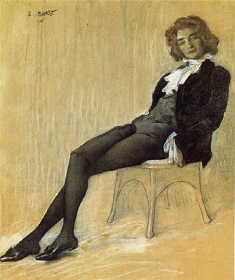
Zinaida Gippius (8 november 1869 – 9 september 1945)
Portret door Leon Bakst, 1906
De Duitse schrijver Peter Weiss werd geboren op 8 november 1916 in Nowawes (het tegenwoordige Neubabelsberg) bij Berlijn. Zie ook alle tags voor Peter Weiss op dit blog en ook mijn blog van 8 november 2010.
Uit: Die Ästhetik des Widerstands
„Das eine schilderte die Abreise des Königs Wilhelm zur Armee, am einunddreißigsten Juli Siebzig. Unter den Linden stand, ehrfürchtig sich verneigend oder in strammer Haltung, hüteschwingend, jubelnd, schluchzend vor Rührung das Volk, und huldvoll winkte der Regent in der Kutsche und fuhr in Richtung Brandenburger Tor, Sedan, Versailles, seiner Proklamierung zum Kaiser und der Gründung des Deutschen Reichs entgegen. Das andre, aus dem Jahr Neunundsiebzig, zeigte ein Ballsouper in den Prunksälen des Schlosses, wo, umglänzt von Gold und Kristall, die ordengeschmückten Herrn in Frack und Galauniform ihre Gläser und Teller balancierten, mit Damen in großer Toilette plaudernd. Zwischen solch festlichem Farbenrausch, schwirrend von Seide, von Juwelen glitzernd, und dem Gewoge von wehenden Fahnen, von Hochrufen auf besonnter Straße, bot sich das verrauchte Eisenwalzwerk dar. Links das Ereignis, von dem es hieß, der Herzschlag der Nation käme darin zum Ausdruck, rechts die Hofgesellschaft unterm Reigen der Engel. Auf der einen Seite die begeisterte Begrüßung des Kriegs, die Erziehung zum Bückling, zum Speichellecken, auf der andern Seite die Verherrlichung schwülstiger Pracht. In der Mitte härteste Schufterei, um denen zur Rechten und Linken den Reichtum zu schaffen. Ein Triptychon über die neuere deutsche Geschichte. Das zentrale Stück mit den Männern in ledernen Schürzen, schwere Stangen und Zangen schwingend, wies den ganzen Betrug auf, der an der Arbeiterklasse begangen wurde. So waren die Arbeitenden, ausgenützt von den Machthabenden, dazu gezwungen worden, den Feldzug gegen Frankreich zu ermöglichen, so hatten sie, verleitet von ihren eignen Parteiführern, den Weltkrieg mit ins Rollen gebracht, und so schmiedeten sie nun dem Faschismus die Waffen. Das Gemälde des Eisenwalzwerks, als Farbdruck weit verbreitet, wurde ihnen, den Produzierenden, als Vorbild, als Mittel zur Erbauung, vorgelegt.“
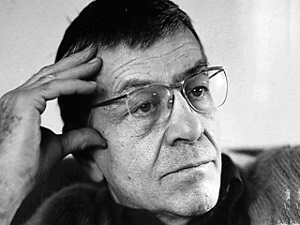
Peter Weiss (8 november 1916 - 10 mei 1982)
De Ierse schrijver Bram Stoker werd geboren op 8 november 1847 in Clontarf, een wijk van Dublin in Ierland. Zie ook alle tags voor Bram Stoker op dit blog en ook mijn blog van 8 november 2010.
Uit: Dracula
"Yes," I said, "Jonathan Harker."
She smiled, and gave some message to an elderly man in white shirtsleeves, who had followed her to the door.
He went, but immediately returned with a letter:
"My friend.--Welcome to the Carpathians. I am anxiously expecting you. Sleep well tonight. At three tomorrow the diligence will start for Bukovina; a place on it is kept for you. At the Borgo Pass my carriage will await you and will bring you to me. I trust that your journey from London has been a happy one, and that you will enjoy your stay in my beautiful land.--Your friend, Dracula."
4 May--I found that my landlord had got a letter from the Count, directing him to secure the best place on the coach for me; but on making inquiries as to details he seemed somewhat reticent, and pretended that he could not understand my German.
This could not be true, because up to then he had understood it perfectly; at least, he answered my questions exactly as if he did.
He and his wife, the old lady who had received me, looked at each other in a frightened sort of way. He mumbled out that the money had been sent in a letter, and that was all he knew. When I asked him if he knew Count Dracula, and could tell me anything of his castle, both he and his wife crossed themselves, and, saying that they knew nothing at all, simply refused to speak further. It was so near the time of starting that I had no time to ask anyone else, for it was all very mysterious and not by any means comforting.
Just before I was leaving, the old lady came up to my room and said in a hysterical way: "Must you go? Oh! Young Herr, must you go?" She was in such an excited state that she seemed to have lost her grip of what German she knew, and mixed it all up with some other language which I did not know at all. I was just able to follow her by asking many questions. When I told her that I must go at once, and that I was engaged on important business, she asked again:
"Do you know what day it is?" I answered that it was the fourth of May. She shook her head as she said again:
"Oh, yes! I know that! I know that, but do you know what day it is?"
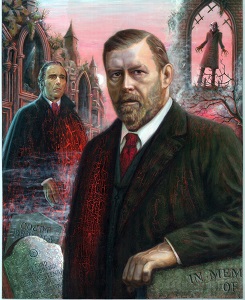
Bram Stoker (8 november 1847 – 20 april 1912)
Portret door Aidan Hickey, 2012
De Amerikaanse schrijfster en oorlogscorrespondente Martha Ellis Gellhorn werd geboren in St. Louis, Missouri op 8 november 1908. Zie ook alle tags voor Martha Gelhorn op dit blog en ook mijn blog van 8 november 2010.
Uit: Is There a New Germany?
“The adults of Germany, who knew Nazism and in their millions cheered and adored Hitler until he started losing, have performed a nationwide act of amnesia; no one individually had a thing to do with the Hitlerian regime and its horrors. (This amnesia began as soon as the conquering Allies entered Germany; not a soul could be found who had approved Hitler or harmed a fly.) The young realize this cannot be true, yet one by one, each explains how guiltless his father was; somebody else's father must have been doing the dirty work. Santayana observed that if a man forgets his past he is condemned to relive it. Germans trained in obedience and dedicated to moral whitewashing are not a new people, nor are they reliable partners for anyone else.
There has always been a small minority of Germans who thought of themselves as members of the human race first, and Germans afterward; there still is such a minority, and they are exiles-at-home. For the sake of humanity, it is to be hoped that their numbers will grow until, for the first time, they wield power in Germany. But if what makes Germans the way they are -- the home, the churches, the schools, the universities -- does not change, Germany will continue to be itself. It is fat, rich, and happy now, and no German wants a war; life is good. What happens if life becomes less good? And no one seems to notice that peaceful Germany is, nevertheless, the one great obstacle to peace in Europe. We quarrel with Russia over the divided Germans as over a festering bone; and no one considers that the fears of our former allies, now enemies in the Soviet bloc, are not hysterical fantasies but are based on a long memory.”
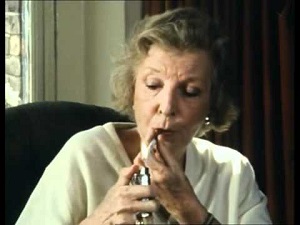
Martha Ellis Gellhorn (8 november 1908 - 16 februari 1998)
Onafhankelijk van geboortedata:
De Zweedse schrijver Carl-Henning Wijkmark werd geboren in 1934 in Stockholm. Zie ook alle tags voor Carl-Henning Wijkmark op dit blog.
Uit: Nahende Nacht (Vertaald door Paul Berf)
„Der Seele wurde der Trost von Religion und Psychologie angeboten und glücklicherweise, darf ich wohl sagen, darüber hinaus das, was zu meiner wichtigsten Stütze wurde: der junge Mann, der jeden Montag und Freitag mit seinem Bücherwagen auftauchte. Ich bin immer schon ein leidenschaftlicher Leser gewesen, aber jetzt las ich wie ein Besessener, und dieses Lesen wuchs zu einem leicht überspannten Projekt, einem Versuch, dem großen Widersacher in die Karten zu schauen und den Kampf auf diese Weise ausgeglichener und die Niederlage erträglicher zu gestalten. Man hat mir nicht vorenthalten, dass meine bemühten Studien in der Kunst des Sterbens mein Leben eher noch verkürzen würden. Das mag stimmen, aber das war es in dem Fall wert.
Ich merkte schnell, dass Harry und Börje, meine Zimmergenossen, die Bücherstapel mit Widerwillen betrachteten, als verstieße ich gegen die Regeln und begäbe mich aus Feigheit vor dem Feind auf Abwege. Auch wenn mir das nichts ausmachte, bekam es auf längere Sicht doch eine gewisse Bedeutung, es führte zu einer Distanz zwischen uns, die bis zuletzt bestehen blieb.
Ich habe von zwei Zimmergenossen gesprochen, aber eigentlich waren es drei. Der dritte hatte eine stumme Rolle und war zudem unsichtbar. Die Erklärung folgt sofort.
Im Bett gegenüber lag Harry, der trotz allem mein Freund wurde - mehr oder weniger, das schwankte je nach Tagesform. Er war in meinem Alter, seit ein paar Jahren pensioniert.“
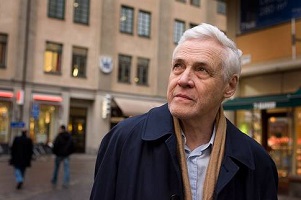
Carl-Henning Wijkmark (Stockholm,1934)
|



